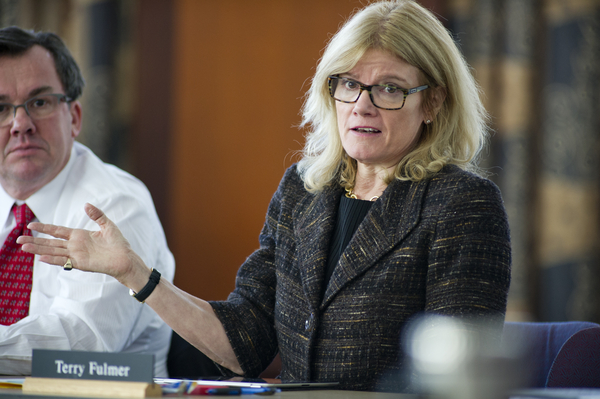Smoke-free campus debate moves to Faculty Senate

The Faculty Senate on Wednesday engaged in a lively discussion about the university’s plan to explore a smoke-free campus, continuing a new committee’s effort to gather feedback on the issue.
Terry Fulmer, dean of the Bouvé College of Health Sciences, and John Auerbach, director of the Institute on Urban Health Research, are co-chairs of a committee comprised of students, faculty, and staff to explore the possibility of implementing a smoke-free campus policy. On Wednesday, Fulmer discussed the issue with the Faculty Senate.
“The opportunity before us is to build on some of the examples we see across some 1,100 non-smoking campuses across the country to create a public health approach to smoking cessation programs across our university community,” Fulmer said.
Following a lengthy discussion that ranged from policy enforcement to smoking cessation programs and the public health implications of smoking, the Senate voted unanimously in support of urging the university to “proceed expeditiously” toward implementing the “programs, processes, and policies needed to make Northeastern a smoke-free campus.” Throughout the discussion, Senate members expressed overwhelming support for programs that help students, faculty, and staff quit smoking, though some expressed concern about implementing a campus-wide ban.
Lori Lefkovitz, the Ruderman Professor and director of Jewish Studies, noted that a policy prohibiting smoking on campus could be overly meddlesome into the lives of students, faculty, and staff.
“People are outside in a public space—we are an open campus—and we are telling them what they cannot do,” said Lefkovitz, who ultimately voted in favor of the motion. “It feels beyond paternalistic to tell an adult staff or faculty member or a student that they cannot smoke.”
Hilary Poriss, an associate professor of music history, said that she found Lefkovitz’s comments persuasive, especially in terms of imposing restrictions on people within a free society. However, she felt that the need to protect people from the potentially harmful impacts of smoking outweighed those concerns, noting that secondhand smoke outside Ryder Hall prevents her from opening her office window during warm months.

Richard Daynard, University Distinguished Professor of Law, heads the Senate Agenda Committee and is a member of the smoke-free campus initiative committee. Photo by Brooks Canaday.
Fulmer explained that the University Health and Counseling Services’ Ready to Quit! program is already in place to help students quit smoking—which often requires multiple attempts to fully break the powerful addiction (options for faculty and staff are available through employee insurance and HRM programs). She also stressed that a potential ban wouldn’t be meant to take a “law-and-order” approach, but rather a public-health strategy.
Richard Daynard, University Distinguished Professor of Law who heads the Senate Agenda Committee and is a member of the smoke-free campus initiative committee, said a prohibition on smoking would spark an important social change, a “normative” move similar to progress made by Massachusetts smoking bans in restaurants and bars.
Since the initiative to explore a smoke-free campus was announced, the committee has prioritized gathering feedback from the Northeastern community in a variety of ways, including through a website dedicated to the issue, email, and by seeking feedback from the many universities nationwide that have implemented some form of a smoke-free policy.
In addition, a forum held last month drew a wide range of opinions from students, who spoke out both against and in favor of a campus-wide smoking ban.
After gathering more feedback, the committee is expected to present its recommendations this spring. Members of the Northeastern community can submit feedback by emailing smokefreeinitiative@neu.edu.





